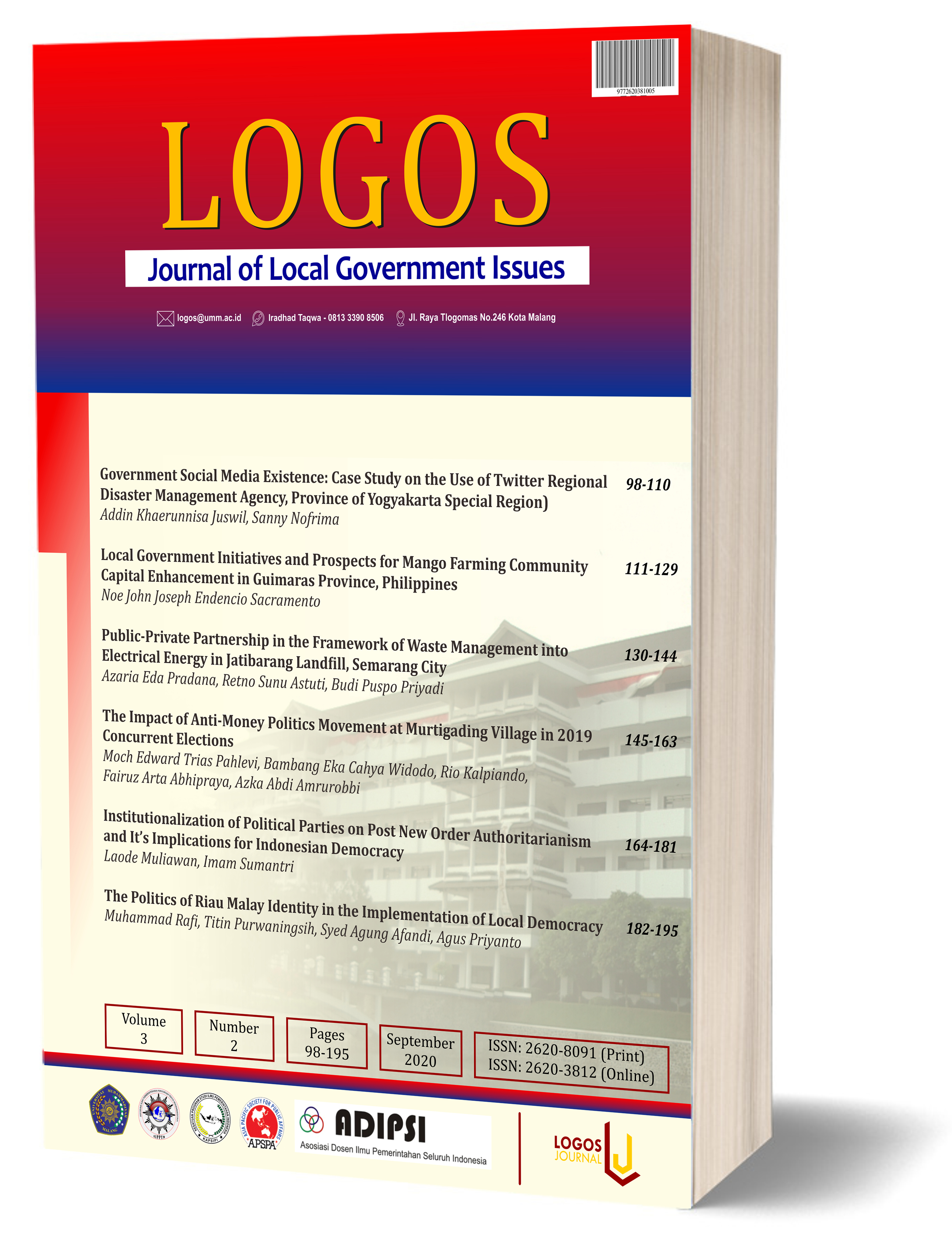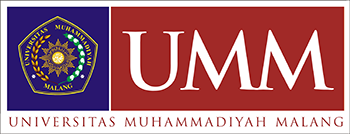Government Social Media Existence: Case Study on the Use of Twitter Regional Disaster Management Agency, Province of Yogyakarta Special Region)
DOI:
https://doi.org/10.22219/logos.v3i2.12113Keywords:
Social Media, Twitter, disaster, Disaster Management Agency (BPBD), Mass CommunicationAbstract
The proper utilization of social media is crucial in terms of disaster management, especially by the government. One of the government’s method to accelerate the dissemination of information regarding disasters is through official government’s twitter account which has proven to be more effective. This study aims to describe the efforts of the Regional Disaster Management Agency (BPBD) of the Special Region of Yogyakarta in handling crisis through a managed twitter account, namely @pusdalops_DIY. This research uses descriptive qualitative research method which is carried out by analyzing the twitter using NVIVO 12 Plus data processing software. The result of this study can be stated that the utilization of the Regional Disaster Management Agency (BPBD) twitter account of the Special Region of Yogyakarta has been effective in disseminating informations and compatible with the main tasks also functions listed in the regional legal basis regarding the Regional Disaster Management Agency (BPBD). However, it still requires further digitalization in all areas of government to be more integrated and communicative in crisis management.
Downloads
References
Anggreani, M. D., Purnomo, E. P., & Kasiwi, A. N. (2020). Ruang Publik Virtual Sebagai Pintu Komunikasi Government To Citizen (Studi Kasus: Perbandingan Media Sosial Pemerintah Kota Yogyakarta dan Surabaya). Moderat: Jurnal Ilmiah Ilmu Pemerintahan, 6(1), 203-220. http://dx.doi.org/10.25157/moderat.v6i1.3165.
Athanasis, N., Themistocleous, M., Kalabokidis, K., Papakonstantinou, A., Soulakellis, N., & Palaiologou, P. (2018). The Emergence of Social Media for Natural Disasters Management: A Big Data Perspective. Int. Arch. Photogramm. Remote Sens. Spatial Inf. Sci, 42(3), W4. https://doi.org/10.1177/1354068817747755.
Daniel, W. T., Obholzer, L., & Hurka, S. (2019). Static and Dynamic Incentives For Twitter Usage in the European Parliament. Party Politics, 25(6), 771-781. https://doi.org/10.1177/1354068817747755.
Dimitrova, D. V., & Matthes, J. (2018). Social Media in Political Campaigning Around the World: Theoretical and Methodological Challenges. Los Angeles: SAGE Publications. https://doi.org/10.1177/1077699018770437.
Djangoan, T. (2019). Sistem Informasi Pengolahan Data Kegiatan Kebencanaan Pada Kantor Badan Penanggulangan Bencana Daerah Provinsi Gorontalo. https://repository.ung.ac.id/skripsi/show/531411117.
Effendi, M. W., Hendra, Y., & Matondang, A. (2019). Persepsi Masyarakat Tentang Citra Pemerintah Kota Medan Melalui Akun Media Sosial Instagram@ humas_pemkomedan. Perspektif, 8(1), 20-26. https://doi.org/10.31289/perspektif.v8i1.2541.
Eom, S.-J., Hwang, H., & Kim, J. H. (2018). Can social media increase government responsiveness? A case study of Seoul, Korea. Government Information Quarterly, 35(1), 109-122. https://doi.org/10.1016/j.giq.2017.10.002.
Fahriyani, S., Harmaningsih, D., & Yunarti, S. (2020). Penggunaan Media Sosial Twitter Untuk Mitigasi Bencana Di Indonesia. IKRA-ITH HUMANIORA: Jurnal Sosial dan Humaniora, 4(2), 56-65.
Firmansyah, M. A., Mulyana, D., Karlinah, S., & Sumartias, S. (2018). Kontestasi Pesan Politik dalam Kampanye Pilpres 2014 di Twitter: dari Kultwit Hingga Twitwar. Jurnal Ilmu Komunikasi, 16(1), 42-53.
Gao, X., & Lee, J. (2017). E-Government Services and Social Media Adoption: Experience of Small Local Governments in Nebraska State. Government Information Quarterly, 34(4), 627-634. https://doi.org/10.1016/j.giq.2017.09.005.
Gupta, K., Ripberger, J., & Wehde, W. (2018). Advocacy Group Messaging on Social Media: Using the Narrative Policy Framework to Study Twitter Messages About Nuclear Energy Policy in the United States. Policy Studies Journal, 46(1), 119-136. https://doi.org/10.1111/psj.12176.
Ibrahim, M., Pratama, S., & Rendy, M. (2018). Social Media Positioning Trend Analysis in 2017 Bangka Belitung Governor Election Campaign. Proceedings of the 5th International Conference on Social and Political Sciences (IcoSaPS 2018),241, 55-60. https://dx.doi.org/10.2991/icosaps-18.2018.16.
Ichsani, N., Amir, A. S., & Yusuf, A. J. (2019). Twitter Presiden dan Representasi Kebijakan Pemerintahan Indonesia-Analisis Isi Twitter Presiden Jokowi. KAREBA: Jurnal Ilmu Komunikasi, 7(1), 54-64. https://doi.org/10.31947/kareba.v7i1.5479.
Juanda, H. (2017). Media Sosial Sebagai Penyebarluasan Informasi Pemerintah Aceh. Jurnal Peurawi: Media Kajian Komunikasi Islam, 1(1). http://dx.doi.org/10.22373/jp.v1i1.1988.
Kahne, J., & Bowyer, B. (2018). The Political Significance of Social Media Activity and Social Networks. Political Communication, 35(3), 470-493. https://doi.org/10.1080/10584609.2018.1426662.
Khairunnisa, K., & Anggadwita, G. (2018). Analisis Pengaruh Efektifitas Media Sosial Twitter Terhadap Government Open Communication Dengan Pendekatan Technology Acceptance Model (tam) Pada Masyarakat Bandung. eProceedings of Management, 5(2).
Kim, J., & Hastak, M. (2018). Social Network Analysis: Characteristics of Online Social Networks After A Disaster. International Journal of Information Management, 38(1), 86-96. https://doi.org/10.1016/j.ijinfomgt.2017.08.003.
King, G., Pan, J., & Roberts, M. E. (2017). How the Chinese Government Fabricates Social Media Posts For Strategic Distraction, Not Engaged Argument. American Political Science Review, 111(3), 484-501. https://doi.org/10.1017/S0003055417000144.
Kurniawan, R., & Yulistyo, D. (2018). Analisis Penggunaan Cerita Rakyat Bengkulu Dalam Pembelajaran Retorika/Komunikasi Massa. ESTETIK: Jurnal Bahasa Indonesia, 1(1), 85-100. http://dx.doi.org/10.29240/estetik.v1i1.513.
Li, Z., Huang, Q., & Emrich, C. T. (2019). Introduction to Social Sensing and Big Data Computing For Disaster Management: International Journal of Digital Earth, 12 (11), 1198-1204. https://doi.org/10.1080/17538947.2019.1670951.
Mauroner, O., & Heudorfer, A. (2016). Social Media in Disaster Management: How Social Media Impact the Work of Volunteer Groups and Aid Organisations in Disaster Preparation and Response. International Journal of Emergency Management, 12(2), 196-217. https://doi.org/10.1504/IJEM.2016.076625.
Mayangsari, I. D., & Ryan, H. (2016). Gerakan Sosial Folower Twitter@ Ridwan Kamil. Jurnal Ilmiah Liski (Lingkar Studi Komunikasi), 2(1), 116-123.
Minanto, A., & Ningsih, I. N. D. K. (2018). Literasi Bencana di Sekolah Gunung Merapi Tentang Mitigasi Bencana dan Kewarganegaraan Transformatif. Wacana: Jurnal Ilmiah Ilmu Komunikasi, 17(2), 207-216.
Moriansyah, L. (2016). Motivasi, Sikap, dan Intensi Pengguna Media Sosial Pada Kampanye Stop Illegal Fishing. Jurnal Manajemen & Agribisnis, 13(3), 192. https://doi.org/10.17358/jma.13.3.192.
Munandar, H., & Suherman, M. (2016). Aktivitas Komunikasi Pemerintahan Ridwan Kamil di Media Sosial. Prosiding Hubungan Masyarakat, 2 (1),423-429.
Novianti, E., Nugraha, A. R., Komalasari, L., Komariah, K., & Rejeki, D. S. (2020). Pemanfaatan Media Sosial Dalam Penyebaran Informasi Program Pemerintah (Studi Kasus Sekretariat Daerah Kabupaten Pangandaran). AL MUNIR: Jurnal Komunikasi dan Penyiaran Islam, 1(1), 48-59. https://doi.org/10.15548/amj-kpi.v0i0.1499.
Oz, M., Zheng, P., & Chen, G. M. (2018). Twitter Versus Facebook: Comparing Incivility, Impoliteness, and Deliberative Attributes. New Media & Society, 20(9), 3400-3419. https://doi.org/10.1177%2F1461444817749516.
Porumbescu, G. A. (2016). Comparing the Effects of eE-Government and Social Media Use on Trust in Government: Evidence From Seoul, South Korea. Public Management Review, 18(9), 1308-1334. https://doi.org/10.1080/14719037.2015.1100751.
Pratiwi, T. A., Bungin, B., & Soenarjanto, B. (2015). Kebebasan Berpendapat Melalui Facebook Dan Twitter: Studi Kasus Undang-Undang Informasi Dan Transaksi Elektronik. representamen, 1(1).
Purwadi, A., Pratama, A. B., & Mahendradi, R. M. (2019). Mengukur Engagement Warga Negara Dalam Interaksi Media Sosial (Studi Pada 32 Akun Resmi Facebook Pemerintah Kabupaten/Kota Di Jawa Tengah). Jurnal Natapraja: Kajian Ilmu Administrasi Negara, 7(1), 1-17. https://doi.org/10.21831/jnp.v7i1.24895.
Rahayu, N. T., Setyarto, S., & Efendi, A. (2015). Model Pewarisan Nilai-Nilai Budaya Jawa Melalui Pemanfaatan Upacara Ritual. Jurnal Ilmu Komunikasi, 12(1), 55-69.
Rini, S., & Sagoro, E. M. (2016). Pengaruh Good Governance dan Pemanfaatan Teknologi Informasi terhadap Kinerja Pegawai Keuangan Dinas Pemerintah Kabupaten Gunungkidul. Jurnal Profita: Kajian Ilmu Akuntansi, 4(2), 1-14.
Salahudin, A. N., Sulistyaningsih, T., Lutfi, M., & Sihidi, I. T. (2020). Analysis of Government Official Twitters during Covid-19 Crisis in Indonesia. Journal of Talent Development and Excellence, 12(1), 3899–3915.
Schwanholz, J., Graham, T., & Stoll, P.-T. (2018). Managing Democracy in the Digital Age. Springer.
Stier, S., Bleier, A., Lietz, H., & Strohmaier, M. (2018). Election Campaigning on Social Media: Politicians, Audiences, and The Mediation of Political Communication on Facebook and Twitter. Political Communication, 35(1), 50-74. https://doi.org/10.1080/10584609.2017.1334728
Susanto, E. H. (2017). Media Sosial Sebagai Pendukung Jaringan Komunikasi Politik. Jurnal Aspikom, 3(3), 379-398.
Tromble, R. (2018). Thanks For (Actually) Responding! How Citizen Demand Shapes Politicians’ Interactive Practices on Twitter. New Media & Society, 20(2), 676-697. https://doi.org/10.1177%2F1461444816669158
Walton, K. (2019). World Leaders a-Twitter: Communication Platforms and Agenda-Building During the 2018 NATO Summit.
Wang, Z., & Ye, X. (2018). Social Media Analytics For Natural Disaster Management. International Journal of Geographical Information Science, 32(1), 49-72. https://doi.org/10.1080/13658816.2017.1367003
Zulfa, A., & Firmansyah, N. A. (2019). Tingkat Pengetahuan Mitigasi Bencana (Hidrologis dan Geologi) dalam Lingkup Masyarakat di Kecamatan Gambiran Kabupaten Banyuwangi. Prosiding Seminar Nasional Geotik, Universitas Muhammadiyah Surakarta, 264-268
Downloads
Published
How to Cite
Issue
Section
License
Copyright (c) 2020 Addin Khaerunnisa Juswil, Sanny Nofrima

This work is licensed under a Creative Commons Attribution-ShareAlike 4.0 International License.
Authors who publish with this journal agree to the following terms:
- Authors retain copyright and grant the journal right of first publication with the work simultaneously licensed under a Creative Commons Attribution-ShareAlike 4.0 International License. that allows others to share the work with an acknowledgment of the work's authorship and initial publication in this journal.
- Authors are able to enter into separate, additional contractual arrangements for the non-exclusive distribution of the journal's published version of the work (e.g., post it to an institutional repository or publish it in a book), with an acknowledgment of its initial publication in this journal.
- Authors are permitted and encouraged to post their work online (e.g., in institutional repositories or on their website) prior to and during the submission process, as it can lead to productive exchanges, as well as earlier and greater citation of published work (See The Effect of Open Access).

This work is licensed under a Creative Commons Attribution-ShareAlike 4.0 International License.













